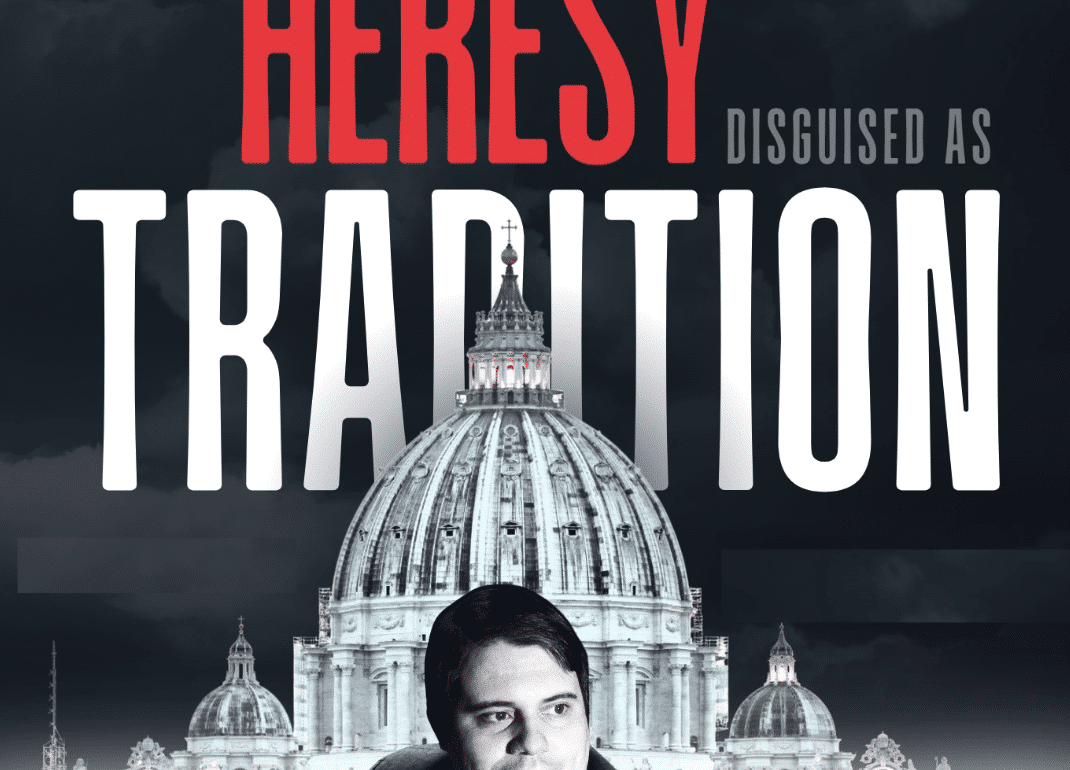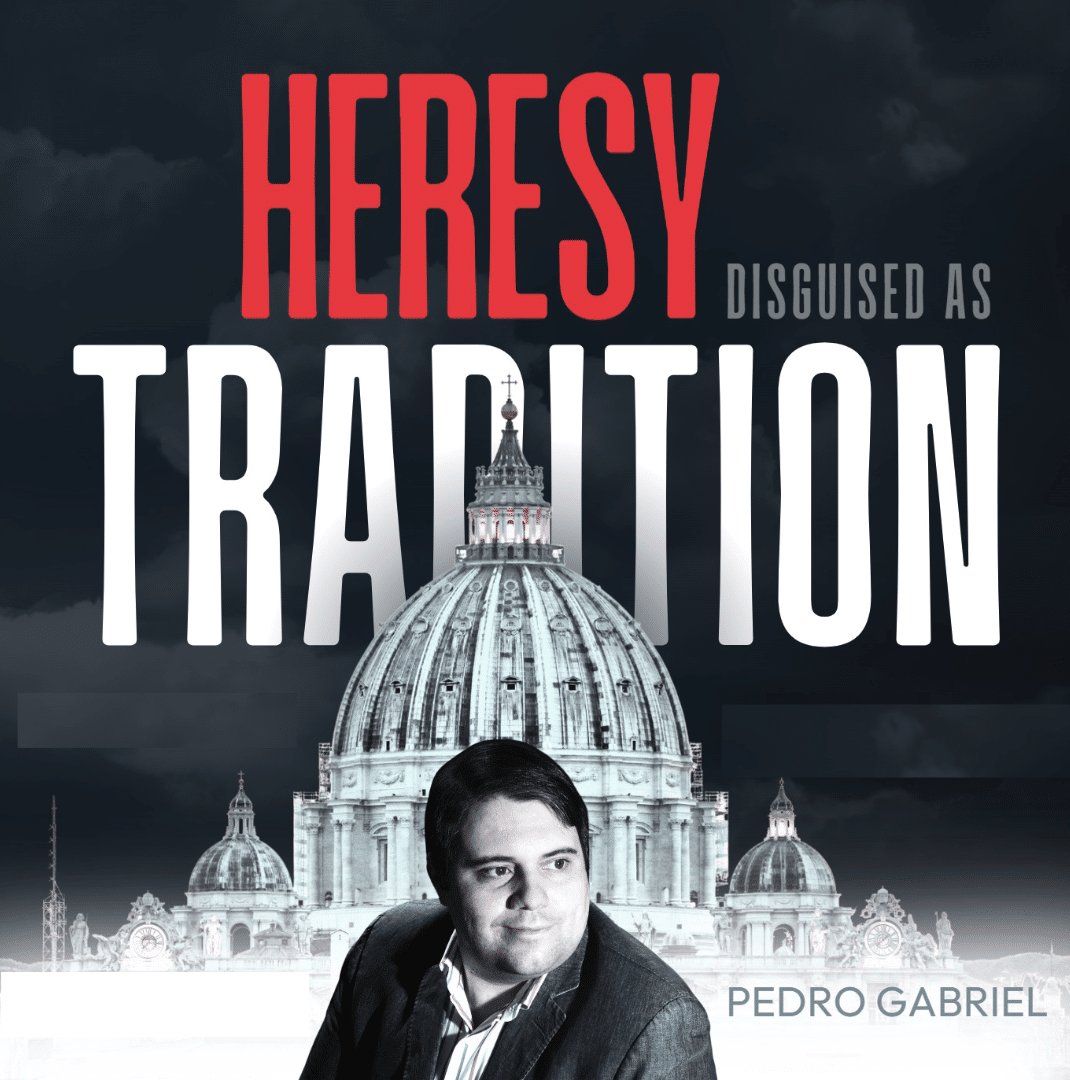When I saw the title, I felt like I had read the book in five seconds. Four words, so obvious, bring to light one of the most crucial problems of the Church today: the lack of a personal, childlike and deep relationship with Jesus and the ecclesial community (which is nothing new) leads many to intellectualize the faith to such a degree that they are capable of getting bogged down in a word, phrase or writing of the Pope, to end up attacking him witheringly, despising the most elementary Christian values.
Granted. The title is frontal. It comes without anesthesia. Only four words that can generate curiosity, provocation, or a strong position a priori. The word “heresy” combined with “tradition”, and the suggestion that the use of the latter could be a disguise for the former, should set off alarm bells in many people who look to the tradition of the Church for their certainties in the faith.
But the style used by the Portuguese Pedro Gabriel allows the honest reader, who dares to free himself from preconceptions, to go through the development of the book’s thesis with lively interest, because it abounds in objective approaches, which in an organic way invite reflection on the importance of understanding the contexts that make up the essence of tradition and of the Church itself.
With clear argumentation, Gabriel exposes the serious errors of radical traditionalists and compares them with similar errors committed in the past, which constitute heresies.
At a time when criticism of the Pope is ruthless, stark, because “his sayings do not conform to the tradition of the Church”, a profound analysis of the meaning of this tradition is imperative. And this is what Peter Gabriel gives us.
“Wise” theologians, influencers and media, pundits of theory, constantly analyze the words of Pope Francis in the light of the doctrine of the Church and its tradition, underhandedly refusing to put them in context, dragging with them a multitude of followers who seek to be faithful to the Church, and who are caught up in the whirlwind of confusion that they generate.
The key to understanding the Magisterium of the Church: humility
I am thinking especially of these individuals, for whom Christianity is neither politics nor ideology, but the path par excellence to sincerely aspire to holiness. It is difficult to go from blindly following a messianic leader who solves everything with perfect argumentation, to opening one’s mind and heart to the Holy Spirit who expresses himself through the one anointed by Him, the Holy Father.
I am thinking of those who have a perfect theological system, of those who follow leaders who instead of learning from the Pope, judge and condemn him. I hope that God grants that through this book they may open their understanding to comprehend the principles by which every pontiff is guided, so that, docile to the inspiration of the Holy Spirit, they may lead the Church of Christ on a prophetic path.
The key to opening oneself to the path of theology and the world of God is humility. Pope Francis affirms that “theology must be done on one’s knees”, and that he who has a closed theological system, he who has an answer for everything, “is a mediocre theologian”.
There have always been traditionalists who fought against the magisterium of their time
Peter Gabriel introduces his book saying:
“Like all the fomenters of heresy and schism, they make false boast of having kept the ancient Catholic faith while they are overturning the principal foundation of the Faith and of Catholic doctrine. They certainly recognize in Scripture and Tradition the source of Divine Revelation, but they refuse to listen to the ever-living magisterium of the Church.”
This phrase is not of today, nor of this century. They were pronounced by Pope Pius IX, who was pontiff between 1846 and 1878.
Apostolic Tradition does not change; ecclesiastical traditions can change
The author, following the teaching embodied in the Catechism of the Church, explains the difference between Tradition and traditions. “What is the difference, then, between “tradition” and “traditions”?, he asks. “What does it mean to say that some traditions are “accidental or temporary?” And he turns to Pope Benedict to clarify: “Ratzinger is alluding to the distinction between apostolic tradition and ecclesial tradition.104F[105] The apostles were promulgators of the truths revealed to them by God, but they were also legislators and pastors of the churches they founded.
Likewise, bishops and popes along history to this very day were not only teachers, but also lawmakers and policymakers. What the apostles preached and wrote regarding revelation constitutes the apostolic tradition and cannot be changed, because it is what God relayed to them in an unrepeatable way. However, as legislators and pastors, they also established certain laws and rules which they deemed necessary or useful in the particular churches they founded. … In the light of Tradition, these traditions can be retained, modified or even abandoned under the guidance of the Church’s Magisterium.”
And he concludes by quoting #83 of the Catechism of the Catholic Church: “Tradition is to be distinguished from the various theological, disciplinary, liturgical or devotional traditions, born in the local churches over time. These are the particular forms, adapted to different places and times, in which the great Tradition is expressed. In the light of Tradition, these traditions can be retained, modified or even abandoned under the guidance of the Church’s Magisterium.”
Rigidity is not a good counselor
The chapter in which the author recounts details of the Amazon Synod, includes a comment made by the Pope on his trip from Madagascar to Rome: “After the First Vatican Council, for example, the last vote, the one on infallibility, a well-sized group left and founded the Old Catholic Church so as to remain ‘true’ to the tradition of the Church. Then they developed differently and now they ordain women. But in that moment they were rigid, they rallied behind orthodoxy and thought that the council had erred.”
The Magisterium of the Church – the Pope – is the authority given by Jesus
In the face of so much confusion, we must stop thinking of the Church as constituted by two factions, as if it were a political party. We must always start from objective foundations. This is the only way to stand on solid ground. Thus the author states that “Jesus Christ, by reason of His divine authority, is the source of all tradition and also the ultimate interpreter of the law.” And he explains: “… we have seen that Jesus can and did bequeath some of His authority to the Church, namely Peter”. And he asks, “How does this interpretative task manifest itself?”
He answers by turning again to the Catechism of the Catholic Church with two paragraphs.
The first states that, “The task of giving an authentic interpretation of the Word of God, whether in its written form or in the form of Tradition, has been entrusted to the living teaching office of the Church alone. Its authority in this matter is exercised in the name of Jesus Christ. This means that the task of interpretation has been entrusted to the bishops in communion with the successor of Peter, the Bishop of Rome.” CCC #85
The second defines that “The task of interpreting the Word of God authentically has been entrusted solely to the Magisterium of the Church, that is, to the Pope and to the bishops in communion with him.” CCC #100 This implies that what is proclaimed by bishops who are not in communion with the pope, that is, those who attack, discredit, defame him, and deny his authority, is obviously not part of the Magisterium.
Paul corrected Peter, but not for his doctrine, but for his hypocrisy
Regarding the argument that “Paul corrected Peter,” the author explains that “usually, Catholic apologists worked tirelessly to debunk that Protestant claim. Now, however, in a stroke of irony, Catholics were the ones propagating this argument.”
After a thorough analysis, the writer reveals the key point. Paul’s reproach to Peter was not about heresy at all, but about Peter’s hypocrisy, “for, until some people came from James, he used to eat with the Gentiles; but when they came, he began to draw back and separated himself, because he was afraid of the circumcised.” Gal. 2, 12
Testimonies
Several personalities make their critique on the book. Thus, Dr. Robert Fastiggi, professor of Systematic Theology at Sacred Heart Major Seminary in Detroit, Michigan, writes that “Pedro Gabriel displays the same admirable qualities found in his other writings, viz., careful research, clear argumentation, and charitable but cogent refutations of the false claims made by papal critics.”
For his part, Dr. Rodrigo Guerra Lopez, Secretary of the Pontifical Commission for Latin America, remarked that “Pedro Gabriel has succeeded in articulating an impassioned Catholic defense of the true Tradition against its pseudo-traditionalist deformations. Nothing could be more timely to understand – once and for all – that the Holy Spirit has not gone on vacation and constantly assists all successors of Peter in leading and governing the Church.”
Rocco Buttiglione, member of the Pontifical Academy of Social Sciences and president of the Academy of Catholic Leaders, states that “Peter Gabriel has the gift of giving transparent and honest answers to intricate questions. Now in this book he explains what Catholic Tradition is. One of the plagues of the current discussion about the Pontificate of Pope Francis are the traditionalists who do not know the tradition of the Church. To propose the same truth in a different context, facing a different culture and different challenges, it is not enough to repeat the same words. Words are always interpreted in context. … The reader will find clear answers in language that is easy to understand and in which shines a fervent love for Tradition and for the body of the incarnate Christ.
In turn, Mike Lewis, co-founder and editor of the renowned website Where Peter Is, expresses that “Dr. Gabriel engages directly with the arguments of radical traditionalists and offers a thorough response, leaving no stone unturned. The book emphasizes the Church’s doctrines regarding the papacy, especially the crucial role of the pope in maintaining the Church’s unity and as the guarantor of orthodoxy. I highly recommend this book to anyone interested in Catholic ecclesiology who wants to understand the ongoing debates about authority and tradition in the Church.”
It is hoped that this book will soon be translated into Spanish and other languages. It is now available in its original language, English, and in Portuguese -Heresia Disfarçada de Tradição-. We hope that it will help to enlighten the minds of those who are authentically seeking accurate answers to the most burning issues in the Church at this time.











